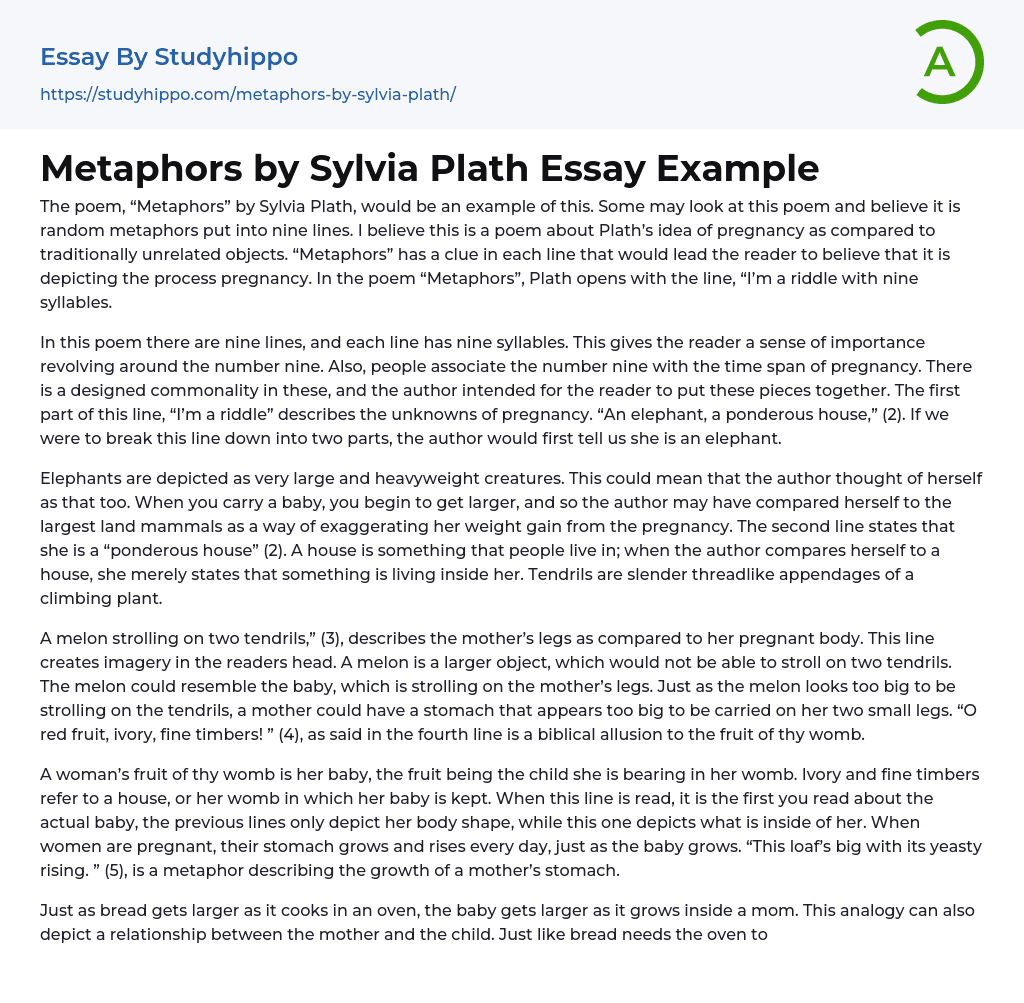The poem "Metaphors" by Sylvia Plath demonstrates the use of random metaphors in nine lines. However, I see this poem as Plath's comparison of pregnancy to seemingly unrelated objects. Each line in "Metaphors" offers a clue that hints at the portrayal of the process of pregnancy. The poem begins with the line, "I'm a riddle with nine syllables."
The poem is composed of nine lines, each containing nine syllables, highlighting the importance of the number nine. Moreover, the number nine is frequently associated with pregnancy. The author purposefully links these elements to convey a message to the reader. The opening statement "I'm a riddle" symbolizes the enigmas of pregnancy. Upon analyzing this line further, the author initially draws a parallel between themselves and an elephant, depicting their size and weight.
>
The author may have seen herself as being as large and heavy as elephants because of their depiction. Just like when carrying a baby, a person's size increases, so the author could have exaggerated her weight gain during pregnancy by comparing herself to the largest land mammals. In the second line, she describes herself as a "ponderous house" (2). By comparing herself to a house, the author is simply stating that there is something living inside her. Tendrils, on the other hand, refer to thin and threadlike appendages of climbing plants.
The mother's legs are compared to a melon strolling on two tendrils. This creates imagery in the reader's mind. The melon, being a larger object, wouldn't normally be able to walk on two tendrils. It's possible that the melon represents the baby walking on the mother's legs. Just a
the melon seems too big to walk on tendrils, the mother's stomach may seem too big to be carried by her small legs. The line "O red fruit, ivory, fine timbers!" is a biblical reference to the fruit of thy womb.
The baby in a woman's womb can be compared to the fruit of her body, with the womb being symbolized by ivory and fine timbers. While the earlier lines focused on the woman's physical form, this line introduces the concept of the actual baby inside her. During pregnancy, a woman's stomach expands and elevates as the baby grows within her. The phrase "This loaf's big with its yeasty rising" (5) metaphorically captures the growth of a mother's stomach.
The baby's growth inside a mother can be likened to bread cooking in an oven. This analogy also reveals the connection between the mother and child, as bread needs an oven to grow just as the child needs its mother for growth. The line "Money's new- minted in this fat purse" (6) emphasizes the significance and impact of the baby on the mother. By minting something, a process of improvement occurs, which can be seen in the baby's growth as well. The use of words like money and purse further allude to pregnancy.
The author suggests that money has significance and worth, while the purse is just a vessel. The author emphasizes that the true importance lies with the baby, viewing herself as merely a carrier lacking true value. This shift towards fear occurs when she realizes that the baby will surpass her in worth and attention. Plath expresses sadness through the line
"I'm a means, a stage, a cow in a calf" (7), fearing that her own value will diminish once the baby is born.
The mother is essentially a tool or vehicle for bringing the baby into the world, comparable to a character in a theatrical production who receives less recognition than the production itself. Like a cow giving birth to a calf, she is praised and noticed less than her baby. The mother's increasing depression stems from the realization that the main focus will be on her baby rather than herself. Unusual cravings are common during pregnancy. The line "I've eaten a bag of green apples" can signify either an odd craving or have biblical connotations, representing sin and premature experiences in life. It could parallel Eve biting into the apple in the Garden of Eden, symbolizing how the mother is condemned to undergo childbirth pain as punishment. The mention of green apples implies that she may not be prepared for this pain, as they are unripe.
The woman's commitment to her pregnancy is emphasized by the final line, "Boarded the train there’s no getting off." (9). This signifies that she has accepted her new life and must embrace it. She understands that abandoning her baby is not an option and strives to be a good mother regardless of the circumstances. These metaphors collectively tell a story, possibly about pregnancy, illustrating the challenges and observations all mothers experience while conceiving a child. While some metaphors may have different meanings, they generally revolve around pregnancy and lead to the same conclusion.
- American Literature essays
- Between The World and Me essays
- Book Report essays
- Book Review essays
- Book Summary essays
- Books essays
- Character essays
- Coming of Age essays
- Dante's Inferno essays
- Everyday Use essays
- Flowers for Algernon essays
- Genre essays
- Greek Mythology essays
- Incidents in The Life of a Slave Girl essays
- Letter essays
- Literary Criticism essays
- Literary devices essays
- Literature Review essays
- Metaphor essays
- Myth essays
- Play essays
- Plot essays
- Poem essays
- Poetry Analysis essays
- Protagonist essays
- Reader essays
- Reason essays
- Rhetoric essays
- Rhetorical Question essays
- Rhyme essays
- Simile essays
- Tragic Hero essays
- Translation essays
- Understanding essays
- Utopia essays
- Villain essays
- Writer essays
- Allegory essays
- Alliteration essays
- Comedy essays
- Comic book essays
- Drama essays
- Dystopia essays
- Fairy Tale essays
- Fantasy essays
- Fiction essays
- Ghost essays
- Gothic Fiction essays
- Gothic Literature essays
- Irony essays




